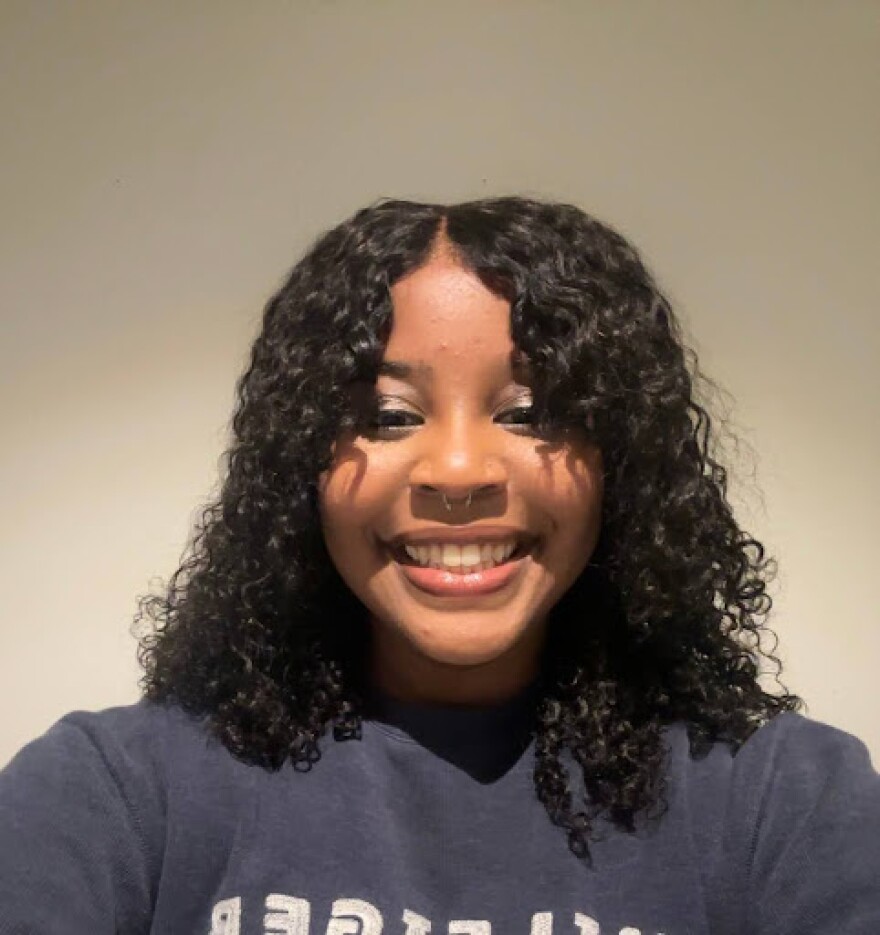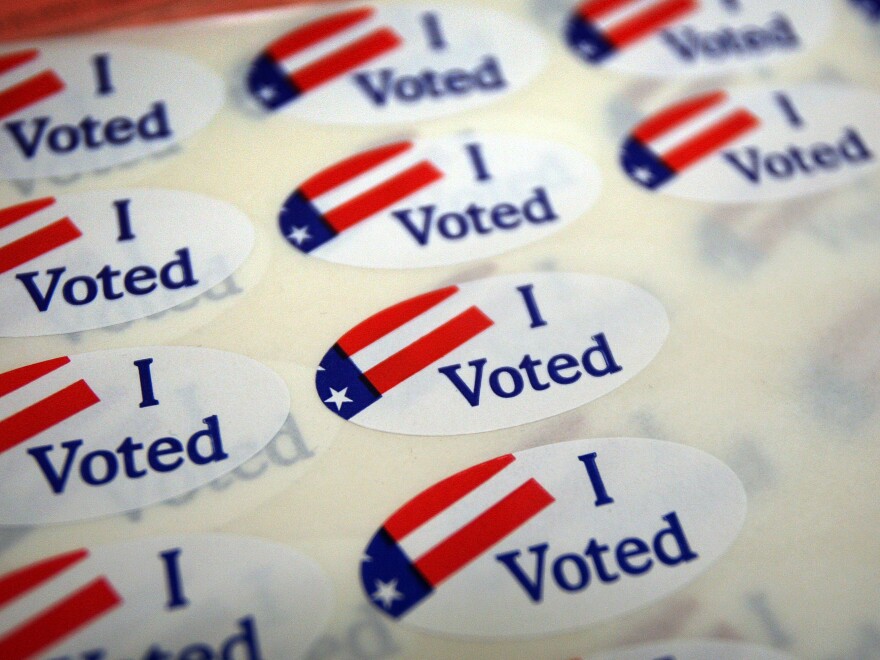Students in Commonwealth University-Bloomsburg’s Journalism Workshop, led by Professor John-Erik Koslosky, set out to talk with young people who will be voting in their first or second presidential election. Rather than ask who they are voting for, the Young Voter Voices Project aimed to learn what matters to these would-be voters and how their perspectives have been shaped.
President Joe Biden has called the youth vote — often defined as those 18-29 — a key driver of his victory in 2020. Young voters turned out for that election at the highest rate since 1972, the first election open to those 18 to 20, according to U.S. Census Bureau data.
Four years later, what matters most to that demographic?
These are the stories those students shared with WVIA News.

Megan Wein
23
Bloomsburg University Graduate Student - Educational Leadership and College Student Affairs
Megan Wein calls her South Williamsport roots conservative. But she says those values began to change once she began her undergraduate studies at Lock Haven University.
“I do not identify as so [conservative] now. I am very Democratic.” she said. “When I went to college and was exposed to different individuals, did my own research and developed my own values and morals, I think that’s what really helped shape who I am today.”
Wein was confident and quick with her response about which issues she'll be thinking about when she votes.
“For me, huge issues are women’s rights and protections for the LGBTQ+ community, especially trans[gender] individuals.” Wein told us. “My brother is gay, and I have a brother that is trans, so I hold those issues very dear to my heart.”
Another issue close to Wein’s heart is affordable childcare. On top of being a full-time student, she also has a four-year-old daughter.
“They do not make it accessible to all [childcare]. Every two weeks, I pay $250, which is about half of my rent each month.” Wein revealed. “So, being more focused on moms in general and making childcare affordable and giving individuals the resources they need to be successful while having children.”
Tatianna Gonzalez
19
Bloomsburg University sophomore
When Tatianna Gonzalez started college as a freshman at Bloomsburg University, she knew she wanted to join the field of social work and advocate for children in her home community of the Bronx, NY.
Seeing friends struggle with abusive home lives and violence in their community motivated her to pursue a career that could make a difference.
“After college, I wanna go back and preach to these kids that this isn’t the life you should choose. You have better options,” Gonzalez said.
She is particularly listening to the candidates' views on affordable childcare and financial support for young parents, as well as funding for social services, such as Children and Youth centers.
Gonzalez cites her own experiences with a social worker as a driving motivation for wanting to join the social work field. Despite not being very politically active previously, Gonzalez says that this election has helped show her the importance of voting.
“When I first came up here, I wasn’t really in tune with voting… I thought it was a joke…but I’m seeing it now.”

Tom Halko
Bloomsburg University senior
“I would like to be able to know I will still have rights in four years and still be able to get married, if I choose to,” said Tom Halko.
Halko, a senior with a double major in theater and media/journalism, is a member of the LGBTQ community and says he is closely following how lawmakers respond to transgender issues.
Halko grew up in the suburbs of Philadelphia and notes that his own family's political viewpoints are split. His dad grew up in a more Republican family, while his mom’s side is more Democratic.
“In high school I grew up in theater and in music, which ended up being much more diverse and accepting communities,” said Halko.
Another important issue for him is the ongoing conflict in the Middle East. He feels there is not enough conversation happening around the Israeli-Palestinian war.
“Both candidates are in support of Israel majorly and plan to help them in the war…people need to continue protesting and pushing the president and local politicians to withdraw support from Israel,” he said.

Kyla Parks
Bloomsburg University junior
Kyla Parks grew up in West Philadelphia, in a predominantly black neighborhood where she first formed her political views.
“I grew up in one of those places that a lot of people in politics speak about like ‘Oh this is a bad area, this is damaging the kids… I had to step back because I’m from there and it’s not what they are talking about… I see it through a different lens,” she said.
Parks references some of the drug problems she's seen in various Philadelphia neighborhoods, and how that makes some politicians view the whole city in a negative light. Yet she'd call her childhood 'a positive experience.'
Parks says despite growing up in an urban area, her major concern is climate change.
“The issue I care about the most, which is crazy that you know a lot of people are surprised about when I say it, is climate change,” Parks said. “I think everybody should care, I think we need to hear more about it, and the huge thing about this is candidates have been able to get away with dodging important questions and issues."

Cora Cotson
Bloomsburg University Junior
Cora Cotson, a Bloomsburg University junior, refers to herself as a “military brat." She says she didn't have much stability until college, where she says she really started to blossom and find herself.
“It really shaped me into becoming the person that I am today, taking on all these roles of being a president of an organization or being a mentor for freshmen,” said Cotson.
Cotson is most concerned with misinformation and disinformation, and how quickly false information can spread.
“People want to see what they want to hear, but they don’t want to see things that don’t align with their beliefs or what they want to believe,” said Cotson.
Cotson is also worried about what the financial future holds for her peers and colleagues, noting that in a recent Bankrates’ down payment survey, 51% of would-be homeowners said that the high cost of living has held them back from affording a down payment and closing costs for a home.
“Especially with our generation, people are figuring out after college like, oh, I’m going to be living with my parents for a couple years, I can’t get a house with these jobs.”

Lakota Reese Shaw
Bloomsburg University freshman
Lakota Reese Shaw comes from a blue-collar household near campus. With siblings, a father who works as a truck driver, and a stay-at-home mother, she considers her household an "average, traditional, American household."
Shaw is currently an Emergent Media major, but has found herself wondering if a life of politics might be for her.
"Human rights," Shaw began. "(They're) a common topic up for discussion in today's society, and with that in mind- and considering the drastic changes that could happen- I think it's such an important topic.”
Shaw is most concerned with the basic rights and freedoms that all people should have from birth until death, regardless of their status or circumstances. She is especially watching what each candidate says on the topics of women's health, reproductive rights, and abortion.
“I think when there is a level playing field,” Shaw continues, “and a level of respect that we all have amongst each other, there is a better work ethic, better outlook on the country, and a willingness to communicate.”

Fidel Inglis
Bloomsburg University senior
Fidel Inglis grew up in Newtown Square, Pennsylvania, a small municipality outside Philadelphia. But he was born in Malawi, Africa, and lived there for 12 years before moving to Pennsylvania.
At 12, Fidel had a fresh view on America and the culture, more specifically the political system.
“At first I didn't really pay much attention to it, I was a kid…but immigration stuck out as a big issue to me, so eventually I started to learn and pay attention because I myself was an immigrant.”
Fidel acknowledges that as a young person, getting involved with politics can seem overwhelming, as he experienced first hand moving to the United States and immediately noticing the polarization between parties.
“It was interesting seeing the two sides of what people think. It is crazy how both parties have two totally different opinions,” Fidel said.
“Politicians all have their own agendas. It is really hard to find a politician that has a vision and doesn’t seem disingenuous.”


